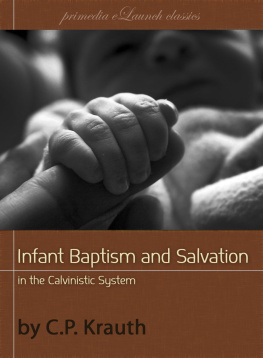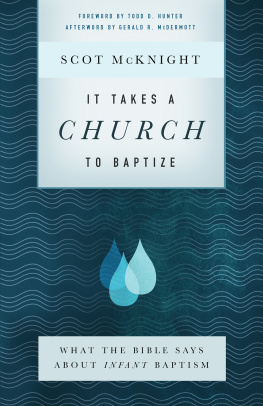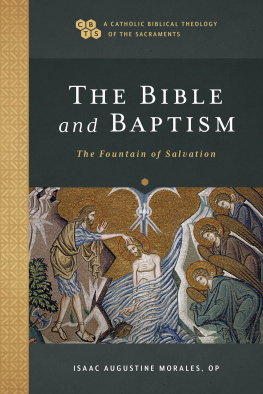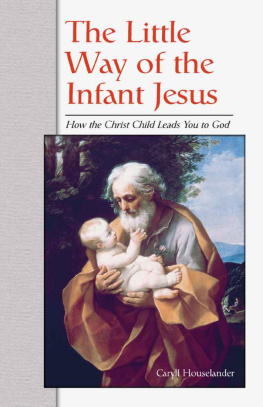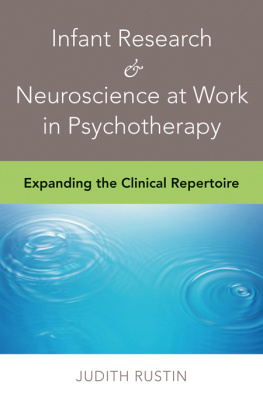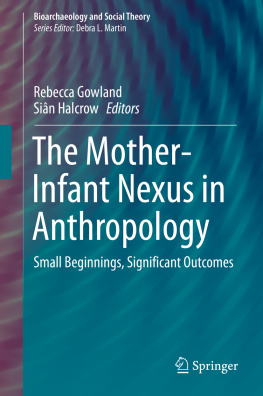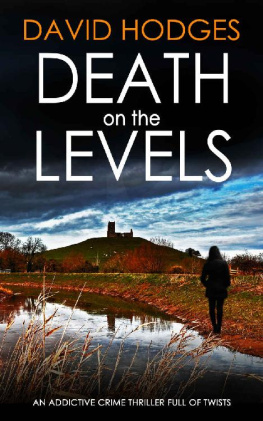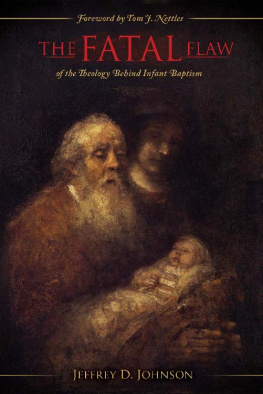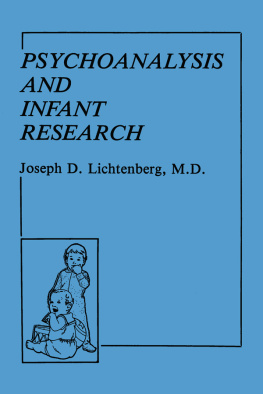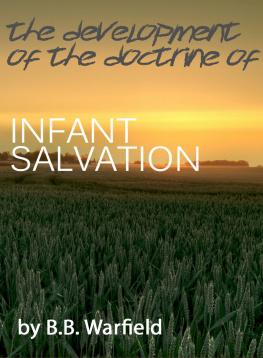Charles Porterfield Krauth - Infant baptism and infant salvation in the Calvinistic system. A review of Dr. Hodges theology
Here you can read online Charles Porterfield Krauth - Infant baptism and infant salvation in the Calvinistic system. A review of Dr. Hodges theology full text of the book (entire story) in english for free. Download pdf and epub, get meaning, cover and reviews about this ebook. City: Philadelphia, year: 1874, publisher: Lutheran Book Concern, genre: Religion. Description of the work, (preface) as well as reviews are available. Best literature library LitArk.com created for fans of good reading and offers a wide selection of genres:
Romance novel
Science fiction
Adventure
Detective
Science
History
Home and family
Prose
Art
Politics
Computer
Non-fiction
Religion
Business
Children
Humor
Choose a favorite category and find really read worthwhile books. Enjoy immersion in the world of imagination, feel the emotions of the characters or learn something new for yourself, make an fascinating discovery.
- Book:Infant baptism and infant salvation in the Calvinistic system. A review of Dr. Hodges theology
- Author:
- Publisher:Lutheran Book Concern
- Genre:
- Year:1874
- City:Philadelphia
- Rating:4 / 5
- Favourites:Add to favourites
- Your mark:
- 80
- 1
- 2
- 3
- 4
- 5
Infant baptism and infant salvation in the Calvinistic system. A review of Dr. Hodges theology: summary, description and annotation
We offer to read an annotation, description, summary or preface (depends on what the author of the book "Infant baptism and infant salvation in the Calvinistic system. A review of Dr. Hodges theology" wrote himself). If you haven't found the necessary information about the book — write in the comments, we will try to find it.
Infant baptism and infant salvation in the Calvinistic system. A review of Dr. Hodges theology — read online for free the complete book (whole text) full work
Below is the text of the book, divided by pages. System saving the place of the last page read, allows you to conveniently read the book "Infant baptism and infant salvation in the Calvinistic system. A review of Dr. Hodges theology" online for free, without having to search again every time where you left off. Put a bookmark, and you can go to the page where you finished reading at any time.
Font size:
Interval:
Bookmark:
BY
C. P.KRAUTH, D.D.
AREVIEW OF DR. HODGE'S SYSTEMATIC THEOLOGY
Withspecial reference to the question of infant baptism and infant salvation, inthe Calvinistic system.
THE work opens with an Introduction, which treats of Method;Theology; Rationalism; Mysticism; the Rule of Faith in the Roman Catholic andProtestant view.
The First Part embraces Theology proper; under which aretreated: Origin of the idea of God; Theism; Anti-theistic Theories; Knowledgeof God; His Nature and Attributes; the Trinity; Divinity of Christ; the HolySpirit; the Decree of God; Creation; Providence; Miracles; Angels.
The Second Part is occupied with Anthropology: Man, hisOrigin and Nature; Origin of the Soul; Unity of the Human Race; Original Stateof Man; Covenant of Works; the Fall; Sin; Free Agency.
The Third Part presents Soteriology: the Plan of Salvation;Covenant of Grace; the Person of Christ; His Mediatorial Work; Prophetic andPriestly Offices; Satisfaction-; for Whom did Christ Die? Theories of theAtonement; Christ's Intercession; Kingly Office; Humiliation; Exaltation;Vocation; Regeneration; Faith; Justification; Sanctification; the Law, with aParticular Commentary on each Commandment; the Means of Grace; the Word of God;the Sacraments; Baptism; the Lord's Supper; Prayer.
The Fourth Part is Eschatology: The State of the Soul afterDeath; Resurrection; Second Advent; Concomitants of the Second Advent.
Of the general fullness and logical order of thisarrangement there can be no question. The discussion of the Divinity of Christas distinct from the Trinity might perhaps better have been given underSoteriology, so as not to separate the "Divinity of Christ" from the"Person of Christ." The most important defect in the plan is that itdoes not embrace a distinct and full treatment of the doctrine concerning theChurch. The omission has been made for some reason which satisfies Dr. Hodge.We hope that it means that he proposes to give to the Church a monograph onthis subject, one of the most vitally important and interesting doctrines atall times, but especially in our own day. We know of no man more competent thanDr. Hodge to rebuke, with the effectual weapons of fact and logic, the insanepretences of the rampant pseudo-ecclesiasticism of our time, and the yetinsaner radicalism, which frightens many into the ecclesiasticism.
The first thing which strikes us in reading Dr. Hodge's bookis the style. Whether we shall accept or reject what he maintains may sometimesinvolve a question, or a pause; but his simple, luminous mode of statementrarely leaves us in any embarrassment as to what it is on which we are todecide. The sentences are never involved. The language is a model of clearness.There is a plain solid sense, the result of a sound judgment thoroughlymatured, which is delightful beyond expression in this day and land of finewriting. This, of course, will expose Dr. Hodge to the charge of shallowness,from those who think that nothing is deep but what is unintelligible, and thatthe art of good writing is the art of putting words to things in the proportionof Falstaff's sack to Falstaffs bread, and that the measure of words is likethe measure of Falstaff in the girth.
Another great feature of Dr. Hodge's book is, its value toour common Christianitynay, in a wide sense, to religion on that broaderdefinition in which the believing Jew has a com-in on interest with theChristian. To the gratitude of Jew and Christian, Dr. Hodge is entitled by theable vindication of Revelation against the assaults which would brine the faithof Jew and Christian alike to the dust. To Roman Catholic and Protestant, Dr.Hodge comes with a defense of the common creeds of Christendom; to Calvinistand Lutheran, with the able argument on the distinctive elements ofProtestantism and the precious truths reasserted by the original Churches ofthe Reformation. Even in its relative isolation as distinctively Calvinistic,Dr. Hodge's book is invaluable. It is the gauge of the type of Calvinism whichis considered by its ablest living representatives as tenable; a Calvinism sogentle in its spirit toward other forms of evangelical Christianity, and sofull of the disposition to mitigate its own harder points, as to furnishironical elements of the most hopeful kind.
The general mildness, fairness, and clearness of the bookare beyond dispute. It treats Polemics in the spirit of Irenics, for the mostpart, but with here and there a delightful little dash of merited sarcasm, asuspicion of irony, a playful contempt for small presumption, and a quiet smileat the absurd, which humanize the argument, and, with those touches which makethe whole world kin, bring the author nearer to the reader. Nor are therewanting earnest and eloquent passages, which deal with sin in a manner inkeeping with its exceeding sinfulness, and with conscious perversions aftertheir evil deserts. There is no amiable inanity in the book. It is not done inwater-colors, as some people would think it must be, because it is not executedwith a red-hot poker on an oak-board. Yet its prevailing character is mild,quiet, firm, judicial. If it is often pleading, it is still more frequently thedecision of a judge, who sums up evidence, interprets the law, and pronouncesthe sentence.
The evidences of enormous, yet reflective, readingeverywhere present themselves, reading of the most varied kind, among the bestbooks and the worst books. There is a gathering of honey for stores, and ofpoisons for the study of antidotes. The range stretches over the ages, takes inlargely the German theology, and reaches apparently almost to the days in whichthe volumes have come from the press. The result of this anxiety to bringthings down to the hour has necessarily been that some of the latest readinghas been hasty and has involved Dr. Hodge in mistakes. But the Doctor'sgreatest weakness, in this immensity of reading, is where it might least havebeen suspectedit is in Calvinistic theology. He seems to have neglected a partof the Calvinistic theologians of no inconsiderable number and bulk. On his ownconfession, so far as his memory can recall, he has failed to have seen asingle one of a very large and influential portion of those divines, so largein fact that for some two centuries it is hard to find one who does not belongto it. But we account for this on the principles of a latent elective affinity.Like seeks only its like and holds it. There rise up in history the grim andgrisly features of those old divines who liked election but who lovedreprobation; who conceived of the human race as created chiefly as fuel forTophet,divines who would have thought nothing of the perdition of a universeor two, and, if necessary, of throwing themselves in, if their logic provedthat it was all for God's greater glorythose inexorable Jonahs on whom awilderness of gourds would have been lost in the attempt to reconcile them tothe sparing of Nineveh. If Dr. Hodge long ago encountered these divines, hequietly turned away into his own brighter path, with other visions of thedivine glory. He did not plunge into the Sahara, in the possibility of findingan oasis. Penetrated, as all his works show, with the completest recognitionwhich is possible to Calvinism, that God is love, Calvinism itself is hardly insharper contrast with Lutheranism than, within Calvinism, Dr. Hodge himself iswith Gomarus and his pitiless school. The only apology which can be made forthat school is that which they constantly make for themselvesthat the logic ofthe system is with them, and that they are with the logic of the system. Theydid not create the horrors, they only told of them.
The general tone of the book is profoundly devout. ThoughDr. Hodge has moved largely and freely in the living world, his most markedaffinities are yet with the old. He saith "the old is better." He hasnot put enough of the new wine into the old bottles to rend themexcept perhapsin a spot or two. In spite of recent reading, and of the space devoted to thecallow heresies of the hour, the conception and organism of the book isprevailingly scholastic, of the old Protestant type. It is old-fashionedtheology in the main; and, like the best old-fashioned theology, it has theheart of living piety beating through it. It is not satisfied "withteaching about theology: it teaches theology, it is theologya true theologiaegenitorum." Its solid judgment and learning will mark it to scholars asone of the classics of Calvinistic Dogmatics, the ablest work in its specificdepartment in English literature. But it is more than this, better than this.The graces of Christian life are not repressed in it, as they have often beenin the arid formulating of systems. Moliere's Mock Doctor claimed no more thanthat the medical profession had changed the place of the heart from the leftside to the right; some of the doctors in theology have left the heart outaltogether. But in Dr. Hodge's Body of Divinity there is a heart whose beat isthat of the fullest healthand you can touch the system nowhere without feelinga pulse. It is a book for the affections. No man could obtrude himself less inhis books than Dr. Hodge does; yet all the more for this very reason do we seethe man himself in his books. His life has been shaped upon the advice of oldSir John Davies:
Font size:
Interval:
Bookmark:
Similar books «Infant baptism and infant salvation in the Calvinistic system. A review of Dr. Hodges theology»
Look at similar books to Infant baptism and infant salvation in the Calvinistic system. A review of Dr. Hodges theology. We have selected literature similar in name and meaning in the hope of providing readers with more options to find new, interesting, not yet read works.
Discussion, reviews of the book Infant baptism and infant salvation in the Calvinistic system. A review of Dr. Hodges theology and just readers' own opinions. Leave your comments, write what you think about the work, its meaning or the main characters. Specify what exactly you liked and what you didn't like, and why you think so.

